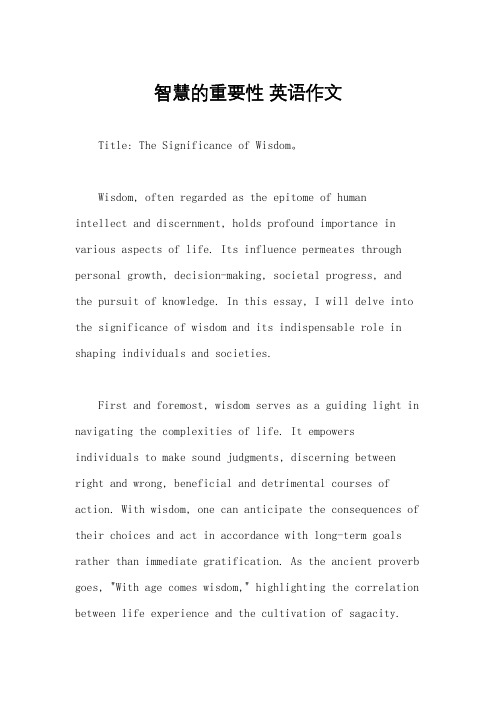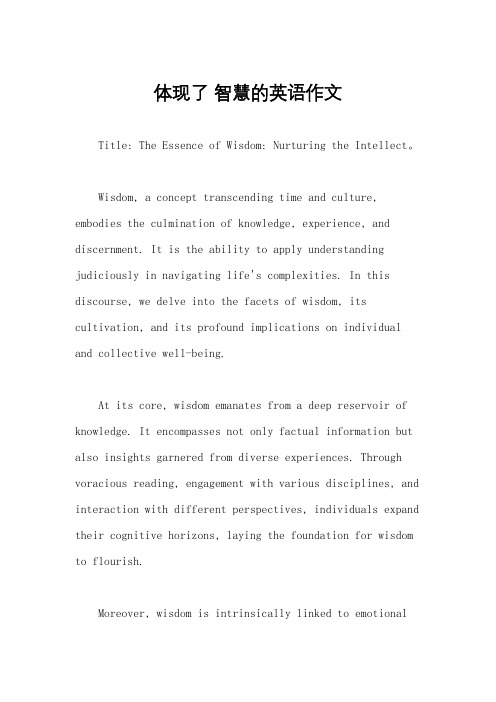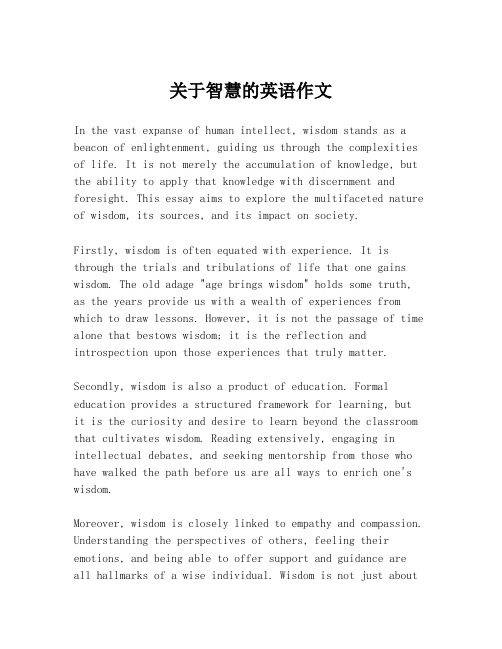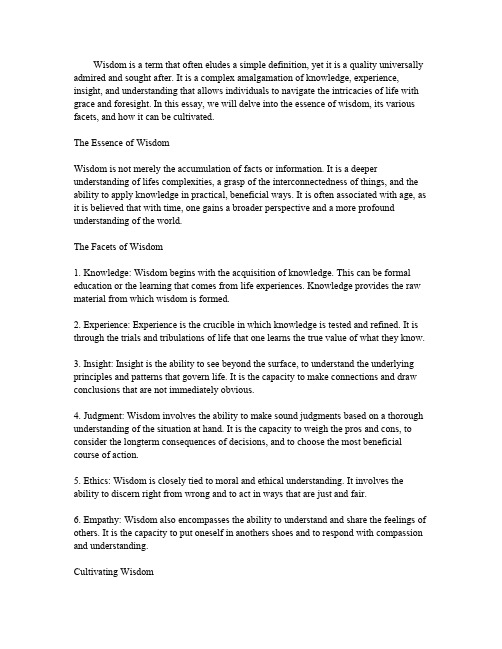关于智慧的英语作文3篇
关于智慧的英语作文3篇_高中英语作文_

关于智慧的英语作文3篇关于智慧的英语篇一:智慧人生After studying a great many of historic materials , books and unearthed relics , he summarize the sani culture in yunnan as ah shi - ma culture . he points out that the traditional sani culture comprises four types , namely the hill culture represented by mizhi woods and mizhi festival , the fire culture by fire pray and torch festival , stone culture by stone worship and zulin - bimo ( priests ) culture . the author comprehensively explains the four psychological features deposit in the traditional sani culture , that is the rational tragedy consciousness , the ideal of searching for utopian home ah zhuo - di , the wise lifestyle rooted from migration and creativity , the open mind to face nonnative culture关于智慧的英语作文篇二:经验和智慧I think the essence of wisdom is emancipation, as far as possible, from the tyranny of the here and the now.We cannot help the egoism of our senses.Sight and sound and touch are bound up with our own bodies and cannot be made impersonal.Our emotions start similarly from ourselves.An infant feels hunger or distress, and is unaffected except by his own physical condition.Gradually with the years, his horizon widens, and, in proportion as his thoughts and feelings become less personal and less concerned with his own physical states, he achieves growing wisdom.This is of course a matter of degree.No one can view the world with complete justice, and if anyone could, he would hardly be able to remain alive.But it is possible to make a continual approach towards justice, on the one hand, by knowing things somewhat remote in time or space, and, on theother hand,by giving to such things their due weight in our feelings.It is this approach towards justice that constitutes growth in wisdom.Can wisdom be taught?And, if it can, should the teaching of it be one of the aims of education?I should answer both these questions in the affirmative.I do not think that knowledge and morals ought to be too much separated.Even the best technicians should also be good citizens: and when I say "citizens," I mean citizens of the world and not of this or that sect or nation.With every increase of knowledge and skill,wisdom becomes more necessary, for every such increase strengthens our capacity of realizing our purposes, and therefore strengthens our capacity for evil, if our purposes are unwise.The world needs wisdom as it has never needed it before: and if knowledge continues to increase, the world will need wisdom in the future even more than it does now.关于智慧的英语作文篇三:多数人的智慧还是少数人的智慧There is an old saying that two heads are better than one, which suggests that the majority’s collective wisdom always dwarfs that of the minority, let alone any individual. There are people who believe that for a society to cohere there must be a strong consensus as well as unity and discipline. Therefore we must not overemphasize the importance of critical thinking which is abound to result in confusion and quarrels.But I don’t agree with t his. First, I have no respect for majority’s wisdom. I believe that most people do not usually use their heads, they are also lack of creativity, and therefore are ignorant and prejudiced and often become mobs and stampede easily. Second, anyone who has the creativity will have an important impact on our society. But their wisdom is usuallydifferent from the majority’s.In a word, everything has two sides. What’s more important is that to learn knowledge from different kinds of wisdom and to improve our ability.。
关于智慧 的英语作文

关于智慧的英语作文Wisdom is something that can't be easily defined. It's not just about being intelligent or knowledgeable, but also about having the ability to make good decisions and show good judgment in different situations. It's about being able to think critically and solve problems effectively.Wisdom is often associated with age and experience, but it's not always the case. There are many young people who display wisdom beyond their years, and there are also older people who lack wisdom in certain aspects of their lives.Having wisdom means being able to see the biggerpicture and understand the consequences of your actions.It's about being able to learn from your mistakes and apply that knowledge to future decisions.Wisdom is also about being open-minded and willing to consider different perspectives. It's about being able to listen to others and take their opinions into accountbefore making a decision.In today's fast-paced and ever-changing world, wisdom is more important than ever. With so much information available at our fingertips, it's easy to get overwhelmed and make impulsive decisions. Having wisdom allows us to filter through the noise and make choices that are truly beneficial for ourselves and others.In conclusion, wisdom is a valuable trait that can't be taught in a traditional sense. It comes from a combination of knowledge, experience, and good judgment. It's something that we should all strive to develop and cultivate in our lives.。
智慧的重要性 英语作文

智慧的重要性英语作文Title: The Significance of Wisdom。
Wisdom, often regarded as the epitome of humanintellect and discernment, holds profound importance in various aspects of life. Its influence permeates through personal growth, decision-making, societal progress, and the pursuit of knowledge. In this essay, I will delve into the significance of wisdom and its indispensable role in shaping individuals and societies.First and foremost, wisdom serves as a guiding light in navigating the complexities of life. It empowersindividuals to make sound judgments, discerning between right and wrong, beneficial and detrimental courses of action. With wisdom, one can anticipate the consequences of their choices and act in accordance with long-term goals rather than immediate gratification. As the ancient proverb goes, "With age comes wisdom," highlighting the correlation between life experience and the cultivation of sagacity.Furthermore, wisdom fosters personal growth and self-awareness. It enables individuals to reflect on their experiences, learn from their mistakes, and continually evolve. Through introspection and contemplation, one gains insights into their strengths, weaknesses, and values, leading to greater authenticity and fulfillment. In essence, wisdom is the cornerstone of emotional intelligence, nurturing empathy, resilience, and humility.In the realm of decision-making, wisdom transcends mere intelligence or knowledge. While intelligence may denote cognitive prowess and information retention, wisdom encompasses a deeper understanding of human nature, ethics, and the interconnectedness of phenomena. It prompts individuals to consider the broader implications of their choices on both present circumstances and future generations. Moreover, wisdom encourages collaboration and consensus-building, recognizing the diversity of perspectives and the importance of collective wisdom in addressing complex challenges.On a societal level, the cultivation and dissemination of wisdom are essential for fostering harmony, justice, and progress. A wise society values education, critical thinking, and open discourse as means to cultivate informed citizens capable of contributing positively to the common good. Moreover, wise leadership is paramount in guiding nations through periods of upheaval and transformation, balancing short-term exigencies with long-termsustainability and equity.History abounds with examples of wise leaders whose sagacious decisions have shaped the course of nations and civilizations. From the philosophical teachings of Confucius to the diplomatic acumen of Nelson Mandela, wisdom has left an indelible mark on humanity's collective consciousness. In an era marked by rapid technological advancements and global interconnectedness, the need for wisdom is more pressing than ever.In conclusion, wisdom is not merely a lofty ideal but a practical virtue with profound implications for individual flourishing and societal well-being. It is the culminationof experience, reflection, and discernment, guiding individuals and societies towards greater insight, compassion, and resilience. As we navigate the complexities of the modern world, let us heed the timeless wisdom of the ages and strive to cultivate and embody this invaluable virtue in all our endeavors.。
体现了 智慧的英语作文

体现了智慧的英语作文Title: The Essence of Wisdom: Nurturing the Intellect。
Wisdom, a concept transcending time and culture, embodies the culmination of knowledge, experience, and discernment. It is the ability to apply understanding judiciously in navigating life's complexities. In this discourse, we delve into the facets of wisdom, its cultivation, and its profound implications on individual and collective well-being.At its core, wisdom emanates from a deep reservoir of knowledge. It encompasses not only factual information but also insights garnered from diverse experiences. Through voracious reading, engagement with various disciplines, and interaction with different perspectives, individuals expand their cognitive horizons, laying the foundation for wisdom to flourish.Moreover, wisdom is intrinsically linked to emotionalintelligence. Understanding one's emotions and those of others fosters empathy, compassion, and sound decision-making. Emotional resilience enables individuals to navigate challenges with grace and fortitude, transcending adversities with equanimity.Cultivating wisdom necessitates reflection and introspection. Taking the time to contemplate past actions, acknowledge shortcomings, and derive lessons paves the path towards personal growth. Through introspective practices such as meditation, journaling, or philosophical discourse, individuals gain clarity of thought and insight into the complexities of existence.Furthermore, wisdom thrives in environments conducive to open dialogue and exchange of ideas. Collaborative endeavors foster innovation, as diverse perspectives converge to tackle multifaceted problems. By embracing intellectual humility and valuing dissenting opinions, individuals cultivate a culture of collective wisdom, transcending individual biases and limitations.The pursuit of wisdom extends beyond individual enrichment to societal transformation. In governance, wise leaders prioritize the common good over personal interests, leveraging their discernment to navigate through socio-political challenges. Through diplomacy and dialogue, they seek sustainable solutions that uphold justice, equality, and human dignity.In education, fostering wisdom entails more than the mere transmission of knowledge; it requires nurturing critical thinking, ethical reasoning, and a sense of civic responsibility. By empowering learners to question assumptions, engage in rigorous inquiry, and empathize with diverse perspectives, educators sow the seeds of wisdom in future generations.Furthermore, the digital age presents bothopportunities and challenges in the cultivation of wisdom. While technology provides unprecedented access to information, it also inundates individuals with a deluge of data, often devoid of context or veracity. Discerning truth from misinformation requires digital literacy, criticalthinking, and a healthy dose of skepticism.In conclusion, wisdom is a testament to the human intellect's capacity to transcend mere knowledge and navigate the complexities of existence with discernment and grace. Through a holistic approach encompassingintellectual inquiry, emotional intelligence, introspection, and collaborative engagement, individuals and societies can nurture the seeds of wisdom, fostering a world guided by reason, compassion, and collective flourishing. As we embark on this journey of self-discovery and enlightenment, let us heed the words of Socrates: "The only true wisdom is in knowing you know nothing."。
关于智慧的英语作文

关于智慧的英语作文In the vast expanse of human intellect, wisdom stands as a beacon of enlightenment, guiding us through the complexities of life. It is not merely the accumulation of knowledge, but the ability to apply that knowledge with discernment and foresight. This essay aims to explore the multifaceted nature of wisdom, its sources, and its impact on society.Firstly, wisdom is often equated with experience. It is through the trials and tribulations of life that one gains wisdom. The old adage "age brings wisdom" holds some truth, as the years provide us with a wealth of experiences from which to draw lessons. However, it is not the passage of time alone that bestows wisdom; it is the reflection and introspection upon those experiences that truly matter.Secondly, wisdom is also a product of education. Formal education provides a structured framework for learning, but it is the curiosity and desire to learn beyond the classroom that cultivates wisdom. Reading extensively, engaging in intellectual debates, and seeking mentorship from those who have walked the path before us are all ways to enrich one's wisdom.Moreover, wisdom is closely linked to empathy and compassion. Understanding the perspectives of others, feeling their emotions, and being able to offer support and guidance areall hallmarks of a wise individual. Wisdom is not just aboutself-growth; it is also about contributing to the growth of others.In addition, wisdom is often associated with humility. A wise person recognizes the limits of their knowledge and is opento learning from others. They do not claim to have all the answers but are willing to listen, to question, and to grow.The impact of wisdom on society cannot be overstated. It fosters a culture of respect, understanding, and cooperation. Wise leaders make decisions that are not only beneficial inthe short term but are also sustainable for future generations. In the realm of personal relationships, wisdom helps in resolving conflicts, building trust, and maintaining harmony.In conclusion, wisdom is a treasure that is not bestowed upon us but is earned through a combination of experience, education, empathy, and humility. It is a lifelong journey of learning and self-improvement. As we navigate through the challenges of life, let us strive to be wiser, not just forour own benefit, but for the betterment of society as a whole.。
智慧的好处英文作文

智慧的好处英文作文英文:The benefits of wisdom are numerous and far-reaching. Wisdom allows us to make better decisions, to understand the world around us, and to live a more fulfilling life. In addition, wisdom can help us navigate difficult situations, overcome challenges, and achieve our goals.One of the key benefits of wisdom is that it allows us to make better decisions. When we have wisdom, we are able to consider all of the factors involved in a decision, weigh the pros and cons, and make a choice that is in our best interest. This can help us avoid making impulsive or irrational decisions that could have negative consequences.Another benefit of wisdom is that it allows us to understand the world around us more deeply. When we have wisdom, we are able to see beyond the surface level of things and understand the underlying causes and motivationsbehind them. This can help us make sense of complex issues and navigate the world with greater ease and confidence.Finally, wisdom can help us live a more fulfilling life. When we have wisdom, we are able to appreciate the beauty and wonder of the world around us, and to find meaning and purpose in our lives. This can help us feel more satisfied and content, and can lead to greater happiness and well-being.In my own life, I have experienced the benefits of wisdom firsthand. For example, when I was faced with a difficult decision about whether to take a new job or stayin my current position, I was able to draw on my wisdom to carefully consider all of the factors involved and make a choice that was in my best interest. As a result, I wasable to avoid making a hasty decision that could have had negative consequences.Overall, I believe that wisdom is one of the most valuable traits that a person can possess. It allows us to make better decisions, understand the world around us, andlive a more fulfilling life. Whether we are facingdifficult challenges or simply trying to navigate the complexities of everyday life, wisdom can help us find our way.中文:智慧的好处是多种多样的,而且影响深远。
智慧的好处英文作文

智慧的好处英文作文The benefits of wisdom are countless. It helps us make better decisions, understand the world around us, and navigate through life's challenges with grace and resilience.Wisdom enables us to see beyond the surface and comprehend the deeper meanings and implications of things. It allows us to consider different perspectives and find solutions to complex problems.With wisdom, we can learn from our mistakes and experiences, and use that knowledge to grow and improve ourselves. It gives us the ability to reflect on our actions and make positive changes in our lives.Wisdom also fosters empathy and understanding towards others. It helps us communicate effectively, resolve conflicts, and build meaningful relationships based on mutual respect and trust.Furthermore, wisdom provides us with a sense of inner peace and contentment. It allows us to accept the things we cannot change and focus on what truly matters in life. It gives us the strength to face adversity and overcome obstacles with a sense of calm and composure.In conclusion, the benefits of wisdom are far-reaching and essential for leading a fulfilling and meaningful life. It empowers us to make informed decisions, grow as individuals, and cultivate positive relationships with others. Embracing wisdom is the key to living a balanced, harmonious, and purposeful existence.。
关于智慧 的英语作文

Wisdom is a term that often eludes a simple definition,yet it is a quality universally admired and sought after.It is a complex amalgamation of knowledge,experience, insight,and understanding that allows individuals to navigate the intricacies of life with grace and foresight.In this essay,we will delve into the essence of wisdom,its various facets,and how it can be cultivated.The Essence of WisdomWisdom is not merely the accumulation of facts or information.It is a deeper understanding of lifes complexities,a grasp of the interconnectedness of things,and the ability to apply knowledge in practical,beneficial ways.It is often associated with age,as it is believed that with time,one gains a broader perspective and a more profound understanding of the world.The Facets of Wisdom1.Knowledge:Wisdom begins with the acquisition of knowledge.This can be formal education or the learning that comes from life experiences.Knowledge provides the raw material from which wisdom is formed.2.Experience:Experience is the crucible in which knowledge is tested and refined.It is through the trials and tribulations of life that one learns the true value of what they know.3.Insight:Insight is the ability to see beyond the surface,to understand the underlying principles and patterns that govern life.It is the capacity to make connections and draw conclusions that are not immediately obvious.4.Judgment:Wisdom involves the ability to make sound judgments based on a thorough understanding of the situation at hand.It is the capacity to weigh the pros and cons,to consider the longterm consequences of decisions,and to choose the most beneficial course of action.5.Ethics:Wisdom is closely tied to moral and ethical understanding.It involves the ability to discern right from wrong and to act in ways that are just and fair.6.Empathy:Wisdom also encompasses the ability to understand and share the feelings of others.It is the capacity to put oneself in anothers shoes and to respond with compassion and understanding.Cultivating WisdomWisdom is not a static quality it is something that can be developed and enhanced over time.Here are some ways to cultivate wisdom:1.Seek Knowledge:Continuously strive to learn new things,whether through formal education,reading,or engaging in intellectual discussions.2.Reflect on Experiences:Take the time to reflect on your experiences,both positive and negative.Consider what you have learned from them and how you can apply those lessons to future situations.3.Practice Mindfulness:Being present and aware in the moment can help you gain insight into the workings of your own mind and the world around you.4.Engage with Others:Wisdom is often gained through the exchange of ideas with others. Engage in conversations that challenge your beliefs and expose you to different perspectives.5.Practice Humility:Recognize that you do not know everything and that there is always more to learn.This openness to new information is a key component of wisdom.6.Develop Emotional Intelligence:Understanding and managing your own emotions,as well as empathizing with the emotions of others,is a critical aspect of wisdom.7.Think LongTerm:Wisdom often involves considering the longterm implications of your actions.Practice thinking beyond the immediate and considering how your decisions will affect your future and the world around you.In conclusion,wisdom is a multifaceted quality that encompasses knowledge,experience, insight,judgment,ethics,and empathy.It is a lifelong pursuit that can be cultivated through continuous learning,reflection,and engagement with the world.As we strive to become wiser,we not only enrich our own lives but also contribute to the collective wisdom of society.。
- 1、下载文档前请自行甄别文档内容的完整性,平台不提供额外的编辑、内容补充、找答案等附加服务。
- 2、"仅部分预览"的文档,不可在线预览部分如存在完整性等问题,可反馈申请退款(可完整预览的文档不适用该条件!)。
- 3、如文档侵犯您的权益,请联系客服反馈,我们会尽快为您处理(人工客服工作时间:9:00-18:30)。
关于智慧的英语作文3篇
关于智慧的英语作文篇一:智慧人生
After studying a great many of historic materials , books and unearthed relics , he summarize the sani culture in yunnan as ah shi - ma culture . he points out that the traditional sani culture comprises four types , namely the hill culture represented by mizhi woods and mizhi festival , the fire culture by fire pray and torch festival , stone culture by stone worship and zulin - bimo ( priests ) culture . the author comprehensively explains the four psychological features deposit in the traditional sani culture , that is the rational tragedy consciousness , the ideal of searching for utopian home ah zhuo - di , the wise lifestyle rooted from migration and creativity , the open mind to face nonnative culture 关于智慧的英语作文篇二:经验和智慧
I think the essence of wisdom is emancipation, as far as possible, from the tyranny of the here and the now.We cannot help the egoism of our senses.Sight and sound and touch are bound up with our own bodies and cannot be made impersonal.Our emotions start similarly from ourselves.An infant feels hunger or distress, and is unaffected except by his
own physical condition.Gradually with the years, his horizon widens, and, in proportion as his thoughts and feelings become less personal and less concerned with his own physical states, he achieves growing wisdom.This is of course a matter of degree.No one can view the world with complete justice, and if anyone could, he would hardly be able to remain alive.But it is possible to make a continual approach towards justice, on the one hand, by knowing things somewhat remote in time or space, and, on the other hand,by giving to such things their due weight in our feelings.It is this approach towards justice that constitutes growth in wisdom.
Can wisdom be taught?And, if it can, should the teaching of it be one of the aims of education?I should answer both these questions in the affirmative.I do not think that knowledge and morals ought to be too much separated.Even the best technicians should also be good citizens: and when I say citizens, I mean citizens of the world and not of this or that sect or nation.With every increase of knowledge and skill,wisdom becomes more necessary, for every such increase strengthens our capacity of realizing our purposes, and therefore strengthens our capacity for evil, if our purposes are unwise.The world needs wisdom as it has never needed it
before: and if knowledge continues to increase, the world will need wisdom in the future even more than it does now.
关于智慧的英语作文篇三:多数人的智慧还是少数人的智慧
There is an old saying that two heads are better than one, which suggests that the majoritys collective wisdom always dwarfs that of the minority, let alone any individual. There are people who believe that for a society to cohere there must be a strong consensus as well as unity and discipline. Therefore we must not overemphasize the importance of critical thinking which is abound to result in confusion and quarrels.
But I dont agree with this. First, I have no respect for majoritys wisdom. I believe that most people do not usually use their heads, they are also lack of creativity, and therefore are ignorant and prejudiced and often become mobs and stampede easily. Second, anyone who has the creativity will have an important impact on our society. But their wisdom is usually different from the majoritys.
In a word, everything has two sides. Whats more important is that to learn knowledge from different kinds of wisdom and to improve our ability.。
